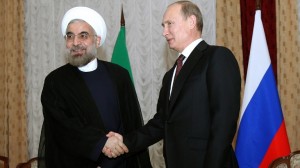 The prospects for improved ties between Washington and Tehran have dramatically increased since Hassan Rouhani replaced Mahmoud Ahmadinejad as president of Iran in August 2013. This has made several parties quite nervous, including American conservatives (who fear it is a trick) as well as Iranian conservatives, Arab Gulf states, and Israel (who all fear that it is not). There is one other party, though, that is quite nervous about what the prospects of improved Iranian-American relations will mean for it: Russia.
The prospects for improved ties between Washington and Tehran have dramatically increased since Hassan Rouhani replaced Mahmoud Ahmadinejad as president of Iran in August 2013. This has made several parties quite nervous, including American conservatives (who fear it is a trick) as well as Iranian conservatives, Arab Gulf states, and Israel (who all fear that it is not). There is one other party, though, that is quite nervous about what the prospects of improved Iranian-American relations will mean for it: Russia.There have already been some signs that Moscow is worried about this. For example, back in February, Russian Deputy Foreign Minister Sergei Ryabkov told journalists that while Moscow did not object to an Iranian-American bilateral dialogue, the Russian government �would like to know the essence of the agreements in order to be certain that no steps are taken in this sphere at Russia�s expense or [that] harm Russian interests.�
While Iran�s first revolutionary leader�Ayatollah Khomeini�was as hostile toward the Soviet Union as he was toward the United States, Moscow managed to improve relations after his death in 1989. Since then, Moscow has benefited from continued Iranian-American hostility in several ways.
First and foremost, American opposition to the export of oil and gas from Central Asia and the Caucasus through Iran to the world market has meant that much of the petroleum exports from these former Soviet republics has had to go through Russia (thus providing Moscow both with transit revenue and political leverage over them). Further, the success of American efforts to decrease Iranian petroleum exports has served to strengthen demand for petroleum from Russia (as well as other petroleum exporters).
In addition, American economic sanctions against Iran as well as Washington�s successful efforts to pressure many Western and other countries not to do business with Tehran has presented opportunities for Russian businesses to gain stakes in Iran that they might not have had otherwise (though, admittedly, the Russians have not done nearly as well in this regard as the Chinese). Finally, Iranian-American hostility has served to simultaneously increase Russia�s importance both to Tehran (as a means of restraining the U.S. vis-�-vis Iran in the UN Security Council and other fora), and to Washington (which has long sought to elicit greater Russian support on the Iranian nuclear issue).
Should an Iranian-American rapprochement actually fully develop, Moscow will lose all these advantages. Improved Iranian-American relations could lead to Caspian Basin oil and gas flowing south via Iranian pipelines to the world market, thus reducing the excess transit revenue and political leverage that Moscow now has over the Caucasus and Central Asia. An end to American economic sanctions will also lead not only to increased Iranian oil exports, but also the opening of the door to Western investment in Iran�s huge but underdeveloped natural gas sector�thus increasing the competition Russian oil and gas faces on the world market. Indeed, Iran�s overall trade with the West will blossom, thereby decreasing Russia�s share in the Iranian market. Improved Iranian-American relations will also mean that neither Washington nor Tehran will need any help from Moscow in dealing with each other.
Finally, Moscow may worry that if improved Iranian-American relations leads to Tehran reducing its support for the Assad regime in Syria, Russia will either be forced to accept whatever agreement the US and Iran reach, or be left to support Damascus all on its own.
Moscow, then, obviously hopes that the budding Iranian-American courtship will fail; it will certainly not do anything to facilitate it. If Washington and Tehran are both serious about pursuing rapprochement, however, there is little that Moscow can do to prevent this from occurring, or to avoid losing the advantages Russia has enjoyed from Iranian-American hostility up to now.
Lobe Log
The Iran Project is not responsible for the content of quoted articles.










